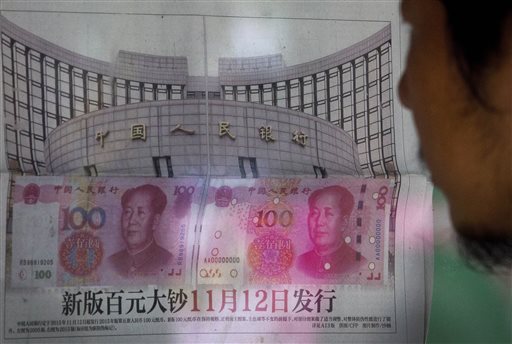
A cheaper yuan will benefit China’s products by making them less expensive overseas. U.S. exporters have long complained that China manipulates its currency to gain a trade advantage. Some members of the U.S. Congress have called for imposing retaliatory tariffs.
As China’s once-breakneck growth has slowed, its reduced demand for foreign raw materials — from oil to coal to copper — has, in turn, slowed growth in countries like Australia and Brazil.
On Tuesday, China’s central bank said the devaluation of the yuan was a result of reforms intended to make its exchange rate more market-oriented. In recent months, the central bank has kept the yuan’s value roughly in line with the dollar, which has surged even as currencies of other developing countries have sagged.
“The move signals that (China) is willing to use all available tools, including a weaker currency, to prop up exports and its domestic economy,” said Eswar Prasad, an international economist at Cornell University. It “could intensify currency competition among the major advanced and emerging market economies that are looking to cheaper currencies to boost exports.”
China becomes the third major economy to act to lower its currency value. Initiatives by Japan and the European Union over the past two years depressed the yen and euro.
Those moves contrast with action foreseen from the Federal Reserve, which is widely expected to boost the short-term interest rate it controls later this year. A Fed rate hike would likely raise the value of the dollar, which has already jumped about 14 percent in value in the past 12 months against a basket of foreign currencies.
The rising dollar has hurt U.S. exporters by making their goods costlier abroad, and China’s move to devalue its currency could further complicate the Fed’s decision on when to raise rates. By making Chinese goods comparatively cheaper in the United States, a lower-valued yuan would contribute further to already-low U.S. inflation.
The Fed wants to be “reasonably confident” that inflation is returning to its 2 percent target before raising rates. Yet inflation has risen just 1.3 percent in the past 12 months.
Michael Feroli, an economist at JPMorgan Chase, suggested that the dollar’s rise poses a concern for some Fed officials, known as doves, who have been reluctant to raise rates. Should the US economy stumble in the coming weeks, “dollar strength would only further embolden the doves at the next meeting,” Feroli said.
Still, Feroli said, “we think this a minor stumbling block for a September” rate increase.
China’s currency move unnerved global investors Tuesday. U.S. stocks tumbled, with the Dow Jones industrial average sinking 219 points by midday.
Analysts cautioned against seeing Beijing’s move as a direct effort to help Chinese exporters. The yuan had strengthened in tandem with the dollar, hurting Chinese exporters and imperiling jobs in key manufacturing industries. July exports plummeted by an unexpectedly steep 8.3 percent from a year earlier.
Tuesday’s move “signals a new government willingness” to let the currency decline, said USB economist Tao Wang in a report.
Beijing will likely move cautiously, but market expectations of further weakening “could quickly become entrenched” and cause the yuan to “depreciate quite quickly and significantly,” Wang said. She said that would represent a “sea change in China’s exchange rate policy” but would help to support flagging economic growth.
Though a weaker yuan might prompt complaints by foreign manufacturers, China’s central bank said its goal was to give market forces a bigger role — a step Washington has demanded.
If the changes help to support Chinese exports, “that could help sustain regional trade and in turn help support global growth,” the governor of the Philippine central bank, Amando Tetangco, told The Associated Press.
The yuan, also known as the renminbi, is allowed to fluctuate in a band 2 percent above or below a rate set by the People’s Bank of China based on the previous day’s trading.
The bank said that starting Tuesday, in addition to the previous day’s exchange rate, the daily fixing of the trading band will take into account supply and demand.
The center of Tuesday’s trading band was set 1.9 percent below Monday’s level. The yuan quickly fell 1.3 percent against the dollar and was down 1.9 percent by the afternoon.
It was the biggest one-day decline since Beijing ended the yuan’s direct link to the U.S. dollar in July 2005 and switched to basing the exchange rate on a basket of foreign currencies. The composition of that basket is secret, but the dollar appears to dominate it, which means the yuan rose even as currencies of other developing countries fell.
The yuan has risen by about 3.5 percent per year since 2012 on a trade-weighted basis and the latest change only gives back part of that, according to Varathan.
ASSOCIATED PRESS

Leave a Reply
You must be logged in to post a comment.